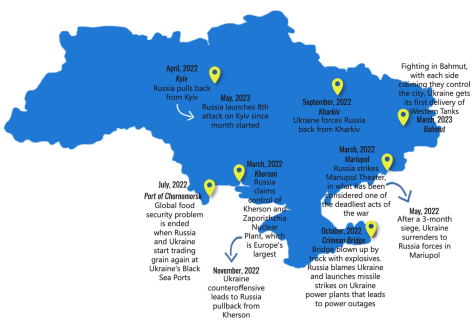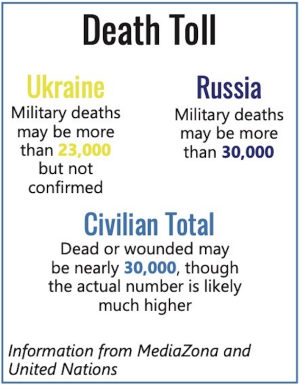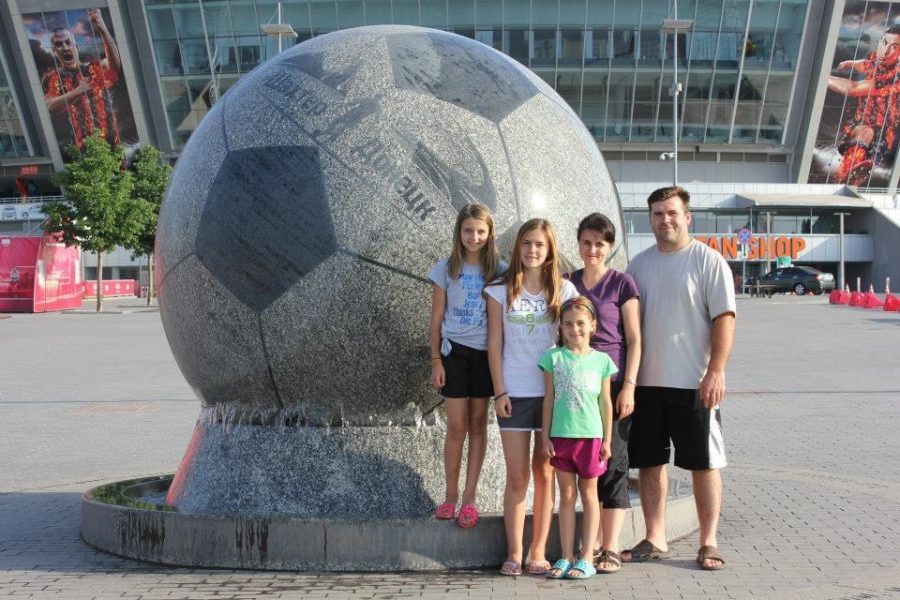Your donation will support the student journalists of Marquette High School. Your contribution will allow us to purchase equipment and cover our annual website hosting costs. You may become a PATRON by making a donation at one of these levels: White/$30, Green/$50, Blue/$100. Patron names will be published in the print newsmagazine, on the website and once per quarter on our social media accounts.
1 Year Update: Russo-Ukrainian War
Students, staff reflect on the war in Ukraine
June 1, 2023
Karina Solomakhina, senior, is from the U.S., but the rest of her family is from Ukraine. Most of them currently live there and have been faced with hard choices due to the Russo-Ukrainian War.
Solomakhina said three of her dad’s nieces and their families have moved to Canada recently as a direct result from the attempted Russian invasion of Ukraine, which has now lasted for 14 months.
They’ve given Ukrainians two choices: either subjugate or die. There’s nothing else.
— Dr. Sophia Wilson
“Learning English makes them nervous because it’s a big change, and it’s harder to learn a new language when you’re older,” Solomakhina said.
She said they are now looking for jobs to support their family.
“It’s really great that Ukraine has been able to hold up this much,” Solomakhina said. “It sucks that they’re still in this position though.”
Professional Perspective
Dr. Sophia Wilson, professor of political science at Southern Illinois University Edwardsville and president of the American Association for Ukrainian Studies, said Russia’s invasion of Ukraine has been nothing short of genocide.
“There is an abundance of evidence that there were war crimes committed, not as a side effect of war but as a strategy of war,” Dr. Wilson said.
Dr. Wilson said civilians in much of unoccupied Ukraine face Russian artillery fire and aerial bombardment, while those under Russian occupation face the violence and harsh repression of the Russian military.
Russia has also attempted to suppress Ukrainian culture and language in occupied regions. As part of this, thousands of Ukrainian children have been forcefully deported to Russia where they are prevented from studying their native language and are taught how to be Russian, Dr. Wilson said.
“They’ve given Ukranians two choices: either subjugate or die,” Dr. Wilson said.
Though it is generally assumed Russia did not expect significant Ukrainian resistance, Dr. Wilson believes otherwise. After the Ukrainian Revolution in 2014, a democratic government was formed. Russia, fearful of their lack of control over the new democracy, attempted to occupy the country by supporting rebel groups in Ukraine.
“Ukrainian civilians then went on the street, and they fought against these Russia-orchestrated coups in 2014,” Dr. Wilson said. “We need to remember that history.”

Dr. Wilson said Ukrainians cared deeply about their democracy and culture, and Russian intelligence knew the people of Ukraine would resist the coming invasion in 2022.
“That is why they came in by bombing on the first days with terror and gun use against civilians,” Dr. Wilson said.
Dr. Wilson said the war has been constantly changing, but Ukraine has had some overall success against Russia. Ukraine has regained their Northern territory along with several cities under siege by the Russian military.
And despite the continued bombings, Dr. Wilson said the country is returning somewhat to a state of normalcy, with people heading back to work and children back to in-person school in the capital of Kiev.
With the help of young Ukrainians and motivated college students, Dr. Wilson said many bombed-out buildings have been rebuilt.
Solomakhina said her family has sent money to their relatives in Ukraine and checked in on them through Skype video calls. Currently, they are holding up despite many fears and difficulties.
I don’t think people are actually thinking about those who are being affected by the conflict and are needing help. They’re just thinking about the politics behind it.
— Isabella Tyulyayev
“They’ve heard the bombings from a distance,” Solomakhina said. “For now, I think they’re in a safe place.”
Dr. Wilson said the conflict, though terribly harmful to so many, is an important moment for Ukraine.
“The scale of the tragedy will be sensed for generations,” Dr. Wilson said. “Ukraine is not just some distant country in Eastern Europe. It’s where global history is changing right now. A hundred years from now, when they are looking at 2023, this is one of the major events that they’ll be studying, because this is definitely a point of no return.”
Dr. Wilson said the idea that the war results from harmful Russian imperial ambitions in their former territories. This creates a Russo-centric attitude regarding the conflict. Dr. Wilson said this conflict is bringing more focus on Ukraine as a nation of significance.
Student Perspective
Isabella Tyulyayev, sophomore, said her mother is from Ukraine and her father is from Russia. Tyulyayev’s mother still has many family friends in Ukraine.
Tyulyayev said the conflict will get worse before it improves.

“I don’t think people are actually thinking about those who are being affected by the conflict and are needing help,” Tyulyayev said. “They’re just thinking about the politics behind it.”
Roman Kidin, sophomore, said his father came to the U.S. from Russia more than 20 years ago at age 17. Most of his family still lives in Russia, and two of his uncles have been forced to fight in the Russian military against Ukraine.
Kidin said his relatives in Russia are acting as if they are completely fine, but his dad knows they are not.
“They’re really struggling on money and basic necessities right now since the economy’s very low due to U.S. embargoes,” Kidin said. “My dad has to send a lot of money to support them.”
Kidin said he doesn’t support Russia’s invasion, but he doesn’t completely support Ukraine either.
“A lot of people think Russians are the sole problem,” Kidin said. “I think they don’t see the other side and the whole story. Russia wants to liberate Russians living in Ukraine that are being persecuted.”
Teacher Perspective
Katie Bauman, AP European History teacher, said the war is taking longer than Russia likely anticipated.
Ukrainian nationalism and pride in their country has played a significant role in their ability to repel Russian forces, something Russia may have underestimated, Bauman said.
They’re really struggling on money and basic necessities right now since the economy’s very low due to U.S. embargoes. My dad has to send a lot of money to support them.
— Roman Kidin
“Russian people themselves aren’t necessarily getting the full story of why they’re invading Ukraine nor the atrocities that are being committed,” Bauman said.
Because of the atrocities —attacks and rapes of Ukrainian people in occupied cities by the Russian military—Bauman said she wishes the U.S. could do more to step in and prevent further conflict.
The U.S. has so far sent $30 billion worth of military equipment to Ukraine, according to the Department of Defense; however, Ukraine has asked for additional support.
“I do not think Russian aggression is done,” Bauman said. “If they are successful in Ukraine, I think that that’s certainly a jumping off point for them to continue their expansion further into Eastern Europe.”

